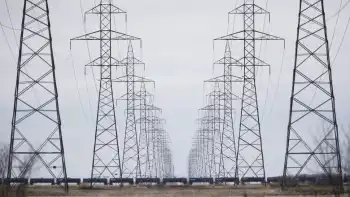Canada's green energy patch: Eastern Ontario
By RenewableEnergyWorld.com
NFPA 70b Training - Electrical Maintenance
Our customized live online or in‑person group training can be delivered to your staff at your location.

- Live Online
- 12 hours Instructor-led
- Group Training Available
The Ontario Power Authority (OPA) recently announced changes to Ontario's standard offer program for renewable energy that will limit new projects in almost all parts of Ontario except Eastern Ontario.
According to Ted Cowan of the Ontario Federation of Agriculture, "The province became a leader in North America by implementing the Renewable Energy Standard Offer. Ontarians with power line access can produce and sell clean power to the grid. For example, a dairy farm with 80 milking cows can earn about $50,000 a year extra by making electricity with the manure."
Eastern Ontario is already leading the way on this technology, which is widely used in Europe. On May 28, Ontario's Chief Energy Conservation Officer, Peter Love presented Vankleek Hill farmers George, Linda and Terry Heinzle with a certificate of recognition. Linda and Terry Heinzle had installed a biodigester to process and convert manure from their 260-cow operation and generate electricity.
The electricity and associated waste heat used for space heating produced from the Heinzle's biodigester (approximately 4,300 kilowatt-hours (kWh) per day) produces between 7 to 10 times the energy necessary to operate the farm operations and residence and they sell the rest to the Ontario Power System. Terry Heinzle's brother George has also installed a system on his adjacent farm.
A third project in Eastern Ontario (out of four operational projects in Ontario) is Paul Klaesi's 170-cow dairy farm at Cobden. He is currently operating a 500 cubic meter anaerobic digester with a 100 kW co-generation unit and is expanding this summer to a 2500 cubic meter anaerobic digester and a 500 kW co-generation unit. Mr. Klaesi is the recipient of the Minister's Award for Excellence in Agri Food Innovation and he is President of the Agri-energy Producers' Association of Ontario.
Two of these projects use grease trap waste blended with the farm-based manure to enhance the energy output of their systems. Just as we don't put grease down the drains in our homes, grocery stores, food processors and many other locations where food products are prepared have to employ grease traps to ensure that the waste materials do not end up in municipal sewers. Disposal of accumulated waste used to be a headache for these businesses.
Companies such as Organic Resource Management Inc., who collect and manage this waste stream on a scientific and environmentally sound basis can now partner with operators of farm based anaerobic digesters to create a multiple wins: for food processors, for farmers, for the environment and now, for the energy sector in Ontario. It is a bioenergy solution that doesn't compete with food supplies, but provides enhancements to every aspect of the food chain.
Eastern Ontario is also home to exciting developments in wind energy.
Trillium Power Wind Corporation (Trillium Power) announced recently that it had completed a bilateral agreement with St. Lawrence College to establish a series of training and educational programs that will assist in the development of offshore and onshore wind projects in Canada. Once these programs are in place, St. Lawrence College will be uniquely positioned as the only educational institution in North America to offer a comprehensive series of courses for maintaining offshore, near-shore and onshore wind developments.
"There is enormous benefit in-store for the citizens of Ontario from the development of offshore wind in The Great Lakes," said Trillium Power president and CEO John Kourtoff.
Don Young, Dean of Applied Sciences at St. Lawrence College, stated: "We have been working for over two years to develop this unique program in Ontario. Our strategic partnership with our European training partners, noted as the best in the world, will provide Ontario with cutting-edge skills for the development of green-collar enterprises and manufacturing in Ontario to meet the exacting requirements of offshore wind development. Trillium Power's support for our programs is very important because they are strategically committed to working together to implement clean energy and sustainable economic development solutions here in Ontario, and elsewhere in Canada."
It is no accident that St. Lawrence College is playing a leading role in preparing its students for opportunities in the burgeoning green collar enterprises in renewable energy and conservation.
Former president, Volker Thomsen's legendary commitment to the environment and sustainable development is reflected in Thomsen House, new programs including Environmental Technician and Energy Systems Technician and Technologist, major energy saving retrofits at all three campuses and his participation in the World Wind Energy Institute. He is co-chairing the World Wind Energy Conference. The conference sees major players in the renewable energy industry from across Canada and around the world come to Kingston.
Finally, eastern Ontario is also the site of North America's largest solar photovoltaic energy park located on approximately 300 acres of land in Lennox & Addington County, Ontario. Joint venture partners SkyPower Corp., a Lehman Brothers Company, and SunEdison Canada announced earlier this year the official groundbreaking of First Light. Construction of the 19-megawatt (MW) solar park is anticipated to be completed by the end of 2009. Local communities will benefit from clean renewable energy sufficient to power more than 2,000 homes annually.











